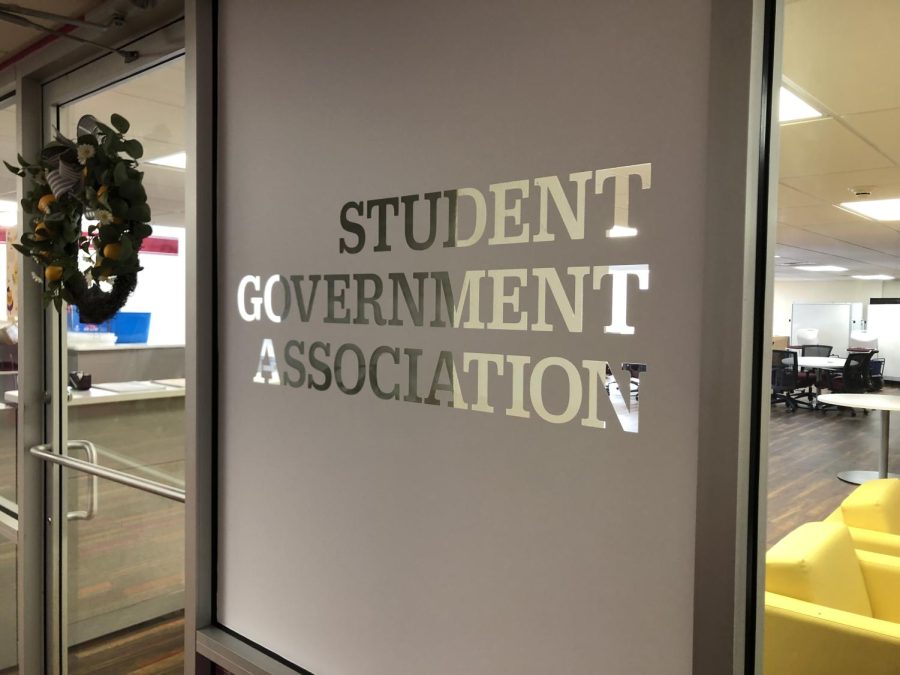SGA said they achieved goals despite setbacks
The sign, which reads “Student Government Association,” sits on the door leading to Loyola’s SGA Hub. Loyola’s current SGA administration recently fininshed their first semester in office.
December 1, 2022
Loyola’s current Student Government Association administration ran on the promises of improving student quality of life, increasing accountability throughout the school, and improving relations between student government and the student body.
Despite what they described as a busy and difficult semester, SGA President Stephanie Oblena and Vice President Viviana Alvarez said that they feel that they have accomplished their main goals, and more, at the halfway point of the school year.
“I feel really good about where we are at,” Oblena said. “If not all of our initiatives have been completed, there’s been some kind of progress, which feels really good.”
Budget cuts and making do
It’s been a busy semester for SGA, Oblena said. Oblena currently serves on Loyola’s search committee for the university’s new president. She said that this responsibility has increased her required time commitment.
Oblena added that because this year’s incoming class was smaller than anticipated, SGA’s overall budget suffered. She said that they had to shift their financial plan and make some budget cuts as a result.
“This semester’s been very eventful,” Oblena said. “We hit the ground running with the late election and then it felt like there was one obstacle after another, with things like the budget and having to make certain decisions.”
Oblena said that despite all of these challenges, she is glad that her administration was able to make do with the money they were given. She said that the amount decreased by $15,000, or 9% less compared to last year.
The average funding for student government at Loyola is roughly $150,000 every semester, with the president, vice president, and cabinet members receiving a total of between $25,000 and $30,000 in compensation per semester.
The president and vice president are receiving around $2,000 less than last year’s administration, according to the budget.
“Me and my team were on the same page that if there were going to be some cuts, it had to start with our compensation because it wouldn’t be right for us to get the same amount of money,” Oblena said.
Three promises
In order to to achieve their promise of boosting student quality of life, Oblena said she is proud to have implemented sexual assault respondent and intervention trainings for the whole student government, as well as a diversity, equality and inclusion training sessions.
“We want to make sure we are investing back into these student leaders that are giving up a lot of their time,” Oblena said.
Oblena added that they are looking into getting SGA members certified to conduct these trainings to other student organizations.
Before Halloween, SGA had a tabling event to hand out nightcap scrunchies, which cover drinks, as well as to share resources on sexual assault awareness, Alvarez said.
“We have focused greatly on sexual assault awareness and prevention, both as an executive cabinet and through the legislative branch,” Alvarez said.
Alvarez added that they’ve also been working to make improvements in Iggy’s Cupboard, Sodexo and dining accommodations by adding more healthy and ready to eat options. She said they have met with Sodexo to discuss dietary restrictions.
Oblena said that going into her position, she took the initiative to create contracts for her staff in order to hold everyone accountable, as well as to include expectations and regulations within each branch and committee.
Each cabinet member has been required to implement committee expectations in order to ensure that everyone is doing their part. Alvarez said that the cabinet has been documenting everything that SGA works on, such as committee meetings and community meetings, which she claims increases transparency and communication within the student government.
“I can see what the chief of staff is working on with a click of a button,” Alvarez said. “I can see what the director of finances is planning with the click of a button.”
Alvarez added that another way they practice accountability is by voicing the need for faculty diversity. They’ve had at least two SGA cabinet members present at each faculty hiring decision at Loyola this semester, she said.
“It is through voicing these concerns that we facilitate dialogue between students and staff to find solutions,” Alvarez said. “So we make sure that those issues are brought to their attention and we brainstorm on how we can fix them.”
Concerning the last campaign promise of student body and student government interactions, Oblena and Alvarez said that they will have meet and greets with student organizations. One will be held on Dec. 1 at 2 p.m. and another early next semester.
Alvarez also noted that their chief justice Jai Shy recently presented a series of programs to educate students on the significance of voting and what was on this year’s ballot during national midterm elections. She also pointed out Director of Finance Patrice Roberts’ hosting financial wellness events.
Looking forward
In January, Oblena said SGA plans to hold a town hall meeting in order to address where they are with their administration’s goals with the student body.
Oblena added that her main focus for next semester’s administrative plan is sustainability and accessibility on campus.
“Just even walking on the campus, you can see it’s not super accessible, so we are seeing what more we can do with the Office of Accessible Education on how we can advocate more for those students,” Oblena said.
Loyola’s student government has more than 29 vacancies according to SGA’s website, but Alvarez said she believes that by cultivating a positive and responsible community of collaborators, retention rates will improve and help reduce burnout.
Alvarez said that the current administration frequently checks in with their staff to make sure that everyone feels good about the work they’re doing, which in turn, she said increases involvement, engagement and retention.
“I want my entire cabinet and their committees to feel as though the work they’re doing is meaningful and not something that’s drawn out, boring, or has no purpose because that will lead to a quicker burnout,” Alvarez said.
Alvarez added that she and her staff want to capitalize on this momentum by continuing to connect with the Loyola community and keeping their eyes and ears open for any concerns that could require open collaboration with student government.
Ava Acharya and Patrick Hamilton contributed to this report









